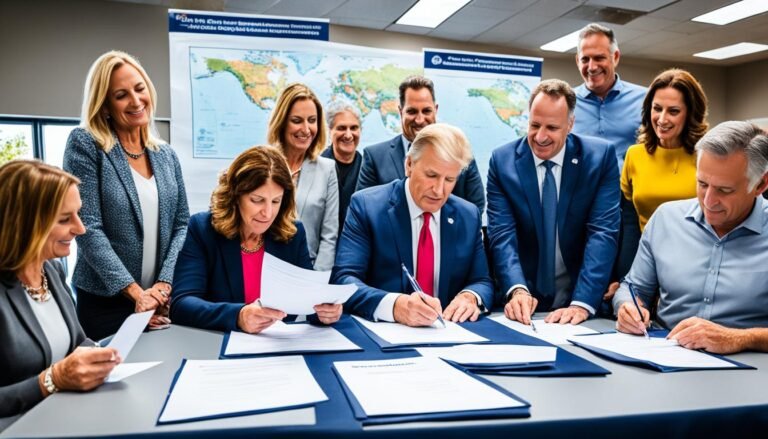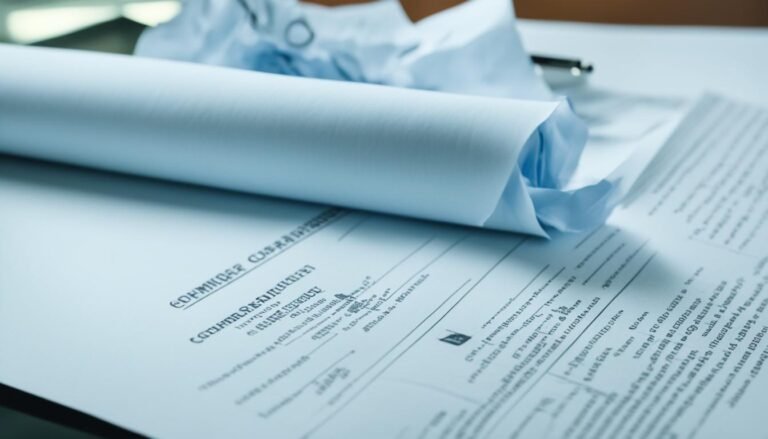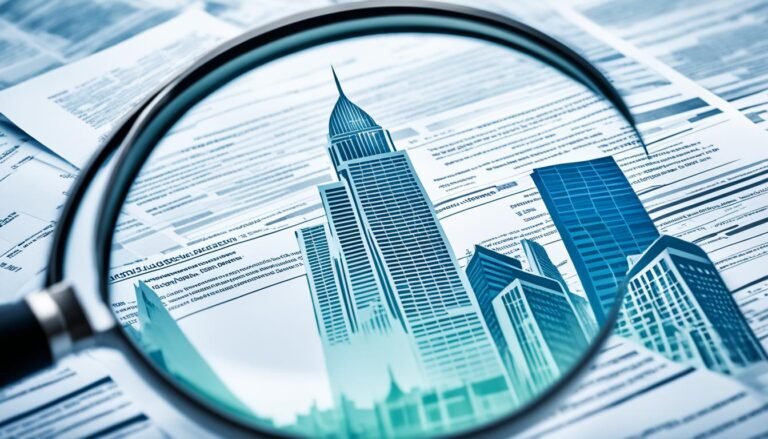Commercial Leases Demystified for SMEs
Do you know that 80% of small businesses rent their commercial space?
Understanding commercial leases before you start your search is key. This knowledge will help you get a good deal. It will also protect your business.
This guide will make commercial real estate leases easier to understand. It will help you confidently negotiate your lease. We will cover lease costs, common terms, and more. All aimed at small business owners.
Key Takeaways:
- Knowing commercial lease agreements is vital if you rent business space.
- Learning about commercial lease costs and differences from residential leases is key.
- Being familiar with lease terms and types of leases helps you negotiate better.
- Getting the right insurance for your lease is important for your business’s safety.
- Negotiating lease terms makes sure it meets your needs and fits your budget.
What is a Commercial Property Lease?
A commercial property lease is a contract. It lets small business owners rent space. It tells both the owner and renter what they can do and must do. Knowing what’s in your lease is key, as is having the right insurance. This helps protect small businesses.
Taking on a lease means you can use that space for your business. It might be for selling, working, or storing goods. The lease sets how long you can stay, when rent is due, and other rules to follow.
There are things you, as the renter, must do. You should keep the place nice, pay rent on time, and follow local rules. Plus, you should be a good neighbor to other businesses or renters. Doing these makes the lease work well for everyone. It ensures a good working relationship.
“A commercial property lease gives clear rules for both tenant and landlord. For small business owners, understanding the lease’s details is a must.”
Commercial lease insurance is crucial for small businesses. This insurance covers risks like damage or theft. It also handles liability claims. Without it, a small business might face large costs alone.
It’s smart for small business owners to look closely at the lease. They should get advice if they need it. And don’t forget about the right insurance. These steps can make leasing easier and help the business grow.
Understanding the Cost of Commercial Property Leases
When you’re looking at a commercial property lease, it’s key to know the cost. There are several things that affect the price. Knowing these will help make smart choices for your business.
Location Impact on Lease Cost
The place of the property is a big deal in its lease cost. Busy city spots can charge more because they’re in high demand. They also attract more visitors. Yet, properties in less popular spots may be cheaper to lease.
Type of Lease Impact on Lease Cost
The lease type you pick affects the price too. You can go for a gross, net, or triple net lease, among others. Each type has its benefits and things to watch out for. So, the rent costs can change. For instance, in a triple net lease, the base rent may be lower. But, the tenant has to pay for extra costs like property tax.
Budget Considerations
It’s vital to think about your budget before you sign a lease. First off, figure out how much you can spend on rent and other costs. Remember to include things like upkeep, utilities, and possible adjustments in costs.
Negotiating Lease Terms
It’s super important to negotiate well. Be clear on what you need and can afford. With a good negotiator, you might get a deal that fits your business’s budget and goals. Negotiating can also help cut down on costs and make sure the lease is right for you long-term.
When looking at the location, lease type, your budget, and negotiating, you can handle commercial lease costs better. This leads to choices that fit your business’s budget and strategy.
| Factors Impacting Commercial Property Lease Cost | Description |
|---|---|
| Location | Prime areas in busy cities often have higher lease costs due to demand and foot traffic. |
| Type of Lease | Different types of leases, such as gross or net leases, can impact the cost structure. |
| Size of Space | The square footage needed for your business can affect the lease price. |
| Local Demand | If there is a high demand for commercial properties in the area, lease costs may increase. |
| Additional Expenses | Consider maintenance fees, utilities, and potential renovations that may impact your budget. |
Commercial Property Lease vs. Residential Lease: Understanding the Difference
Commercial leases and residential leases are very different. Residential leases are for homes, while commercial leases suit businesses. Businesses can include shops, offices, or storage spaces. The rules for commercial leases, like legal protections and negotiation rights, are more complex. Small business owners need to pay close attention to these rules.
This is an image comparing a commercial property lease to a residential one.
Commercial Property Lease Terms and Definitions
Before you sign a commercial property lease, it’s vital to understand the main terms and what they mean. Knowing these terms can make the negotiation process smoother. It ensures you understand what you’re agreeing to.
1. Parties involved: A commercial property lease has two key players – the landlord and the tenant. The landlord owns the property, and the tenant uses it for their business.
2. Premises clause: This clause explains the area you’re renting in detail. It describes the space’s limits and features, which ensures both parties are clear on what’s being leased.
3. Use clause: The use clause states how the tenant can use the space. It says if there are any specific rules or limitations. This makes sure the tenant follows the law and local rules.
4. Insurance clause: The insurance clause tells the tenant what kind of insurance they need. It might specify the type and amount of insurance to get to protect against risks.
5. Term of lease: The term of the lease is how long the tenant can use the space. It could be a set time, like one or five years, or can be more flexible, like month-to-month.
6. Rent: Rent is the money the tenant pays the landlord each month. The lease should be clear on how much rent, when it’s due, and what happens if it’s late.
7. Security deposit: A security deposit is money the tenant gives to the landlord as protection. It covers damages or unpaid rent. The tenant usually gets it back if they follow the rules.
8. Changes and improvements: This clause talks about how the tenant can and can’t change the space. It might require the landlord’s approval for any changes or that the space must return to its original state later.
9. Important lease clauses: Key clauses to review include renewal options, how to end the lease early, how to settle a disagreement, payment for lawyers, and using someone to guarantee the rent. These rules really matter for both the tenant and the landlord.
“Understanding the key terms and definitions commonly found in commercial property leases is crucial before signing any agreement.”
Knowing these commercial lease terms will help you in lease talks and protect what’s important to you. Always read through the lease carefully and get advice from a lawyer, if needed. This way, you can be sure you’re making the right choice when leasing a commercial space.
| Term | Definition |
|---|---|
| Parties involved | The landlord and the tenant |
| Premises clause | Description of the rented space |
| Use clause | Permitted use of the premises |
| Insurance clause | Insurance requirements for the tenant |
| Term of lease | Length of time for tenant’s occupancy |
| Rent | Monthly payment for the premises |
| Security deposit | Sum of money for security against damages |
| Changes and improvements | Conditions for tenant modifications |
| Important lease clauses | Option to renew, breaking the lease, dispute resolution, attorney fees, personal guarantors |
The 7 Types of Commercial Property Leases
Understanding different commercial leases is key when renting. Each lease type comes with its responsibilities for landlords and tenants. Knowing these structures helps pick the best for your business. There are seven main types of leases to consider.
Gross Lease
Under a gross lease, landlords pay for the property’s operations. This means they handle property taxes, insurance, maintenance, and utilities. Tenants only need to worry about a fixed rent amount. The rest is taken care of by the landlord.
Net Lease
In a net lease, tenants cover the property’s operating costs in addition to the base rent. These costs can include property taxes, insurance, and maintenance. Net leases come in single, double, or triple versions, each outlining who pays for what extra expense.
Percentage Lease
For a percentage lease, tenants pay a base rent plus a fraction of their sales. It’s often used in retail, allowing landlords to share in the tenant’s business success. They get a cut based on the revenue.
Ground Lease
In a ground lease, tenants rent land to build on or improve. This is different from owning leased land, as the tenant has the right to use and develop it for a set time.
Each commercial lease type has its own benefits and things to think about. Knowing the details can help you choose the right lease for your business.
| Lease Type | Responsibilities |
|---|---|
| Gross Lease | Landlord covers operating expenses |
| Net Lease | Tenant pays operating expenses on top of base rent |
| Single Net Lease | Tenant pays rent and property taxes |
| Double Net Lease | Tenant pays rent, property taxes, and insurance premiums |
| Triple Net Lease | Tenant pays rent, property taxes, insurance premiums, and maintenance costs |
| Percentage Lease | Tenant pays base rent plus a percentage of sales |
| Ground Lease | Tenant rents land for development or improvements |
How NEXT Helps with Commercial Property Lease Insurance
Finding the right insurance for your commercial property lease is key. It protects your business well. NEXT provides personalized small business insurance. This helps meet your specific needs.
Applying is quick and easy online. You can get a quote, check options, and buy coverage in under 10 minutes. After paying, you instantly get a certificate of insurance. Policy updates can be managed anytime, through their site or app.
For your commercial property lease, NEXT offers what small businesses need. Their custom policies cover commercial leases well. This ensures you’re secure if the unexpected happens.
Getting insurance with NEXT is smooth and suits your schedule. Their online process is simple to use. It allows you to quickly get a quote for your insurance.
After getting a quote, you can look at different plans. Choosing one that’s right for your business is easy. NEXT has a variety of options, fitting businesses of all kinds.
When you find the perfect policy, buying it is a few clicks away. It’s all done securely online with NEXT. This makes sure your business gets the protection it needs fast.
With NEXT, you get proof of insurance right after buying it. This is the certificate of insurance. You can show it to landlords or anyone else involved in your property lease.
Managing your policy is convenient with NEXT’s online tools. You can do it from any device whenever you need. This is great for fitting insurance into your business’s busy life.
Overall, NEXT is there for your commercial property insurance needs. They make the whole process easy and quick, from start to finish. This way, keeping your business safe is hassle-free.
Understanding Common Area Maintenance (CAM) Charges in Commercial Leases
CAM charges are a key part of a commercial lease for small business owners. These charges pay for keeping up shared areas in a building. Think of hallways, entryways, and more.
When tenants pay CAM charges, it keeps these areas nice for everyone. Customers and visitors will have a better experience. This is because the areas they see are well-maintained.
In the lease, it’s laid out how much each tenant has to pay for CAM. This is based on the space they rent. It’s smart to read through your lease to know all your responsibilities.
Tenants should know where their CAM money goes. They should get info on how it’s spent. This helps keep things fair. If there are issues, open talk is important.
Also, tenants can check up on CAM expenses to make sure they’re fair. This right to check helps keep everything honest and clear. It’s a way to make sure the bill is right.
There are many types of CAM charges, like for cleaning and security. This list is not exhaustive. It includes many services tenants share.
Knowing about CAM charges helps business owners plan their budget better. Talking with your landlord is also key. It helps clear up any questions about CAM costs.
Key Considerations for Negotiating Lease Terms and Provisions
Small business owners must think about key factors when negotiating lease terms. This ensures the lease fits their budget and needs. Evaluating these factors helps a tenant get a fair lease that protects them.
Lease Length
Deciding how long a lease should be is crucial. It depends on the business’s growth strategy. Shorter leases offer flexibility, while longer ones bring stability and may save money. By looking at business goals and market trends, tenants can choose the right lease length.
Pricing
Knowing the price of the lease is vital. Owners need to compare rates for similar spaces to ensure a reasonable deal. This knowledge helps in asking for fair rent and avoiding overpaying.
Tenant Responsibilities
It’s important to outline what tenants will be responsible for in the lease. They need to look at tasks like upkeep, repairs, and utilities. This ensures both parties know their duties well.
CAM Caps
Setting limits on Common Area Maintenance (CAM) costs is key. CAM caps control how much these charges can increase. This step is important for budgeting and avoiding sudden cost hikes.
Auditing Rights and Budget Transparency
Tenants should ask for the right to audit expenses, including CAM charges. This helps ensure bills are fair and correct. Negotiating for transparent budgets prevents extra and unnecessary charges.
Negotiation Strategies
Good negotiation skills are vital to getting a favorable lease. Owners should do their homework on market rates and lease clauses. Being well-prepared allows for a stronger negotiation position.
Participation in Decision Making
It’s good for tenants to have a say in maintaining shared spaces. This ensures their specific needs are considered. Being active in decisions benefits the tenant’s use of the property.
Documentation
Keeping records of all lease negotiations is crucial. This documentation is important if there are later disagreements. It protects both the tenant and the landlord.
Summary
Negotiating a lease involves thinking about many important details. Lease length, pricing, and tenant duties are just some aspects to consider. By carefully looking into these areas and discussing with the landlord, a business owner can secure a lease that is fair and suits their needs.
Questions to Ask Before Signing a Commercial Lease
Before you sign a commercial lease, it’s smart to ask key questions. This ensures you know all the important details. You can then make a decision that fits your business needs and protects your interests.
1. Request CAM Expense History
Ask for the CAM (Common Area Maintenance) costs for the last three years. This information is key. It lets you see the property’s upkeep costs and understand its financial side.
2. Speak to Other Tenants
Talk to the current tenants about their experiences. Their feedback is precious. It can give you insights into how the property is managed and any potential issues. This is vital before you sign the lease.
3. Inquire About the Managing Agent
Know who manages the property and their role. This is important. They will handle any problems that come up during your lease. Understanding this can help you know who to speak with if issues arise.
4. Understand Tax, Insurance, and CAM Allocations
Get clear on how tax, insurance, and CAM charges are split. It’s crucial to know who pays. This helps you avoid unexpected costs down the road.
5. Seek Legal Review and Advice
Getting legal advice before signing is smart. A commercial lease lawyer can ensure the terms are fair. They help understand your obligations and protect your rights.
6. Ensure You Have a Commercial Lease Lawyer
Hiring a commercial lease lawyer can really help. They will make sure you understand the lease. Having them on your side ensures your interests are looked after.
Make sure to go through the lease with care and ask these questions. This gives you the info needed to decide. Following these steps can make your leasing experience smooth and successful.
Conclusion
Commercial leases for small and medium-sized enterprises (SMEs) can seem tricky. They need a good grasp of the lease terms to understand. By knowing the details, you can navigate through lease negotiations with confidence. This will help you find the right space for your business, within your budget. It’s vital to review the lease agreement carefully and consider getting legal advice. Also, don’t overlook the importance of insurance for your business.
It’s key for small business owners to grasp the broader implications of lease terms. Make certain you know the deal about lease length, pricing, and what you’re responsible for. Understand things like maintenance fees and how clear the budget should be. When you negotiate for better lease terms, your business will benefit in the long run.
Thinking of leasing a commercial space? Pay close attention to details and be prepared. This means looking through the lease with care, getting legal advice, and thinking about insurance. With the right information and preparation, you can sign a commercial lease confidently. This way, you’ll find a space that helps your business succeed and grow.
FAQ
Q: What is a Commercial Property Lease?
A: A commercial property lease is a contract. It lets small business owners rent space for their business. It covers what both the landlord and tenant need to do. It’s wise to have commercial lease insurance to protect your business.
Q: What factors determine the cost of a commercial property lease?
A: Location, size, and local demand decide a lease’s cost. Different types of leases can also change the price.
Q: How do commercial property leases differ from residential leases?
A: Commercial leases are for business use, unlike residential leases. They are more detailed and can be adjusted to fit the business’s needs. Also, businesses have fewer rights compared to living in a home.
Q: What are some key terms and definitions in commercial property leases?
A: Major terms include who’s in the agreement, what spaces are covered, how they can be used, insurance, how long the lease is, the rent, security deposit, any changes or improvements allowed, and clauses for renewing the lease or solving disputes.
Q: What are the types of commercial property leases?
A: Types include leases that cover all costs (gross lease), leases where tenants pay some costs directly (net), and many options in between.
Percentage leases base rent on the business’s sales, while ground leases are for just the land beneath a building, among others.
Q: How can NEXT help with commercial property lease insurance?
A: NEXT offers insurance designed for small businesses. You can get a quote, see your options, and buy insurance online easily.
Q: What are common area maintenance (CAM) charges?
A: These are charges for keeping up shared areas on a commercial site. They include fixing and running these spaces. Usually, they are part of the lease.
Q: What should I consider when negotiating lease terms and provisions?
A: Think about how long the lease should be, the price, and who pays for what. Also, consider how the costs for common areas are capped, if you can check the landlord’s books, rights in negotiations, and keeping good records.
Q: What questions should I ask before signing a commercial lease?
A: Ask for the history of CAM charges, talk to other tenants, get to know the managing agent, ask about taxes and insurance, get a legal review, and consider a commercial lease lawyer before signing.







